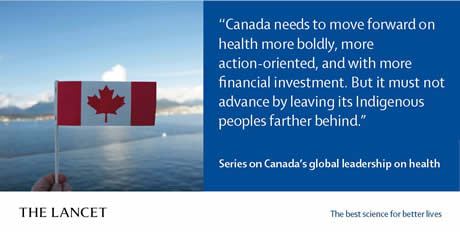Drawing attention to persistent health inequities
 © Credit: David Schloss/MacCreate/Getty Images
© Credit: David Schloss/MacCreate/Getty Images
In their commentary on two papers in the Lancet’s Series on Canada, authors Greenwood, de Leeuw and Lindsay draw attention to the persistent health inequities experienced by First Nations, Inuit and Métis peoples, despite Canada’s commitment to addressing health equity both domestically, through its universal healthcare system, and internationally. These inequities are rooted not only in historical and contemporary colonialism, colonial policies and legislation, but are also perpetuated by unique barriers to accessing healthcare. These barriers include inequitable federal funding for health and social services for First Nations children living on reserve, a failure to address jurisdictional gaps in services and fully implement Jordan’s Principle, as well as a lack of cultural safety in services provision. These barriers continue to contribute to health inequities for Indigenous children, youth, families and communities. The authors call for a transformation of the healthcare system at multiple levels to create equity, safety and respect through the development of practices, policies, and structures that reflect and respect the cultures of the populations being served, and through respectful inter- and multi-sectoral collaborations and partnerships between all stakeholders with a shared goal of providing care to all Canadians.
Read the paper: Challenges in health equity for Indigenous peoples in Canada - Comment by Margo Greenwood, Sarah de Leeuw, and Nicole Lindsay
The Lancet’s Series on Canada
The Lancet’s Series on Canada examines the country’s system of universal health coverage and its global role in health, including Canada’s legacy, challenges, and future path on issues such as access to health care, gender equality, global health diplomacy, and Indigenous peoples’ health. Led by authors from across the country’s diverse ethnocultural, linguistic, and geographic landscape, the Series sets the stage for accelerated Canadian leadership on health at home and abroad, as Canada marks 150 years since confederation and assumes the G7 presidency for 2018. Commentaries by leaders in Indigenous health and foreign aid assistance, and by Prime Minister Justin Trudeau and Minister Jane Philpott, show Canada to be poised for more action, more financial investment, and bolder leadership on health for the world.